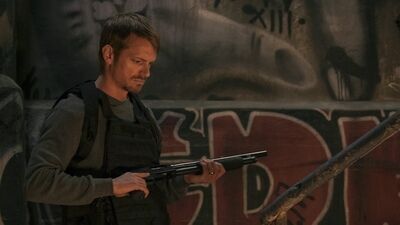Nobody speaks a full word of written dialogue. Characters grunt when they crash against a wall, get punched in the gut, or are struck by a car. They gasp or scream when they’re shot or tortured. You hear sound effects and soundscape noises throughout, such as wind, rain, footsteps, and traffic. There are pop songs with lyrics on the soundtrack, interspersed with long stretches of Marco Beltrami’s deeply felt, unabashedly melodramatic score. But nobody talks, as a regular person would. They exchange looks. Or, if they’re alone and contemplating something tragic or troubling, they’ll stare into space or down at their hands, lost in thought.
Not that they do this sort of thing constantly, mind you. Much of the time, they’re trying to kill each other, using guns, fists, feet, knives, explosives, cars, motorcycles, and everyday household objects. Or they’re conducting surveillance, drawing up plans, hardening their bodies, practicing lethal skills, and so on, because that’s the kind of movie this is: the kind where people let their actions do the talking.
I suspect people who don’t like the movie will say it is unrealistic or that its existence requires such continuous maintenance on the filmmakers’ part that the result is more distracting or alienating than engrossing. I have nothing to say to such people other than, “This movie is not for you.” The film’s dedication to its concept is the origin point for everything unique about it. The result of its thoroughness is an exercise in pure filmmaking. Picture plus sound plus music plus performance. The stuff that cinema is supposed to be made of.
To that end, “Silent Night” pays tribute to one of Woo’s greatest influences, operatic western director extraordinaire Sergio Leone, while pushing the master’s aesthetic further than Leone ever did. The film is sort of an inverted opera. Or a ballet with violence and intimations of violence in place of dance. The performers don’t speak, much less sing. But their faces and bodies do. The purity of emotion they communicate is disarming, unique, and—if you surrender to the exercise—unexpectedly moving.

